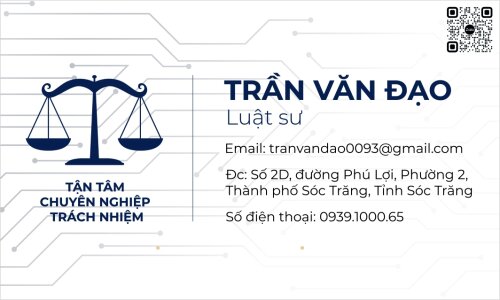Best General Litigation Lawyers in Can Tho
Share your needs with us, get contacted by law firms.
Free. Takes 2 min.
List of the best lawyers in Can Tho, Vietnam
About Litigation Law in Can Tho, Vietnam
Litigation in Can Tho, Vietnam, involves resolving disputes through the court system. It encompasses civil lawsuits, commercial disputes, family matters, and occasionally criminal cases. The legal framework in Vietnam is structured under the Socialist Republic premise, and Can Tho, being a central city in the Mekong Delta, follows the Civil Law system predominantly. Litigations here are usually conducted in Vietnamese, and it is crucial to understand local legal practices, which may differ from Western regions.
Why You May Need a Lawyer
Engaging a lawyer is often essential in litigation cases for several reasons. Individuals may require legal assistance when facing complex legal issues in personal or business disputes, needing contract enforcement, undergoing divorce or custody battles, or if involved in criminal charges. A lawyer can provide expert advice, protect your legal rights, and ensure that you are fairly represented in court. Navigating the Vietnamese legal system can be intricate, emphasizing the importance of professional legal guidance.
Local Laws Overview
The legal system in Can Tho is heavily codified, and it is essential for litigants to comprehend the following key aspects:
- The Civil Procedure Code governs how civil cases are processed, addressing filing, evidence presentation, and appeals.
- Vietnamese law places a strong emphasis on negotiation and mediation before proceeding with formal litigation. Utilizing these out-of-court settlements can often be more expedient and cost-effective.
- The judiciary system is composed of a hierarchical structure of courts, from district-level to Supreme Court, with specialized courts for different legal issues.
- Understanding local regulations and customary practices is crucial, as these can influence the outcome of cases significantly.
Frequently Asked Questions
What types of cases do litigation lawyers in Can Tho handle?
Lawyers handle various types of cases, including civil disputes, commercial contract breaches, personal injury claims, family law issues, employment disputes, and sometimes criminal cases.
How do I find a reputable litigation lawyer in Can Tho?
Choosing a lawyer can be facilitated through bar associations, personal recommendations, online reviews, or legal directories that list qualified practitioners in Can Tho.
What should I bring to my first meeting with a litigation lawyer?
Documents related to your case, any correspondence between parties, identification, and a summary of your concerns or questions would be helpful to provide context.
How long does a litigation case typically take to resolve in Can Tho?
The duration varies significantly depending on the case complexity, court schedule, and willingness of parties to negotiate. Simple cases may resolve in months, while complex ones can last several years.
What are the costs associated with hiring a litigation lawyer?
Costs can vary based on the lawyer’s experience, the complexity of your case, and the fee agreement. Fee structures may be hourly, fixed, or contingent - always clarify this upfront.
Can a lawyer represent me in court if I don't speak Vietnamese?
Yes, they can. It is advisable to engage a lawyer fluent in your native language or hire an interpreter to ensure clear communication and understanding of legal proceedings.
What alternatives to litigation exist in Can Tho?
Mediation and arbitration are two popular alternatives, offering faster and often less expensive resolutions without court involvement.
What is the role of a judge in a civil litigation case in Can Tho?
A judge in Can Tho oversees proceedings, ensures legal compliance, evaluates evidence, and makes decisions or rulings based on the facts and laws applicable to the case.
What is the difference between civil and criminal litigation?
Civil litigation involves disputes between individuals or organizations over legal rights and duties. Criminal litigation deals with actions considered harmful to society at large, prosecuted by the state.
How can I protect my interests during litigation?
Consult regularly with your lawyer, stay informed about your legal rights, maintain transparency regarding your case details, and be proactive in seeking solutions.
Additional Resources
For further assistance, the following resources can be helpful:
- Can Tho Bar Association: Offers resources and directories for legal professionals.
- Legal Assistance Centers in Can Tho: Provide free or low-cost services to eligible individuals.
- Vietnam’s Ministry of Justice website: Offers comprehensive legal documents and updates.
Next Steps
If you require legal assistance in litigation, consider taking the following steps:
- Identify the core issue of your dispute and gather all relevant documents and information.
- Research and select a qualified lawyer or legal firm in Can Tho specializing in your type of case.
- Schedule a consultation to discuss your case, legal options, and establish a plan of action.
- Follow your lawyer's advice closely, and maintain open lines of communication throughout the litigation process.
- Explore alternative dispute resolution options, if applicable, to potentially achieve faster resolution.
Lawzana helps you find the best lawyers and law firms in Can Tho through a curated and pre-screened list of qualified legal professionals. Our platform offers rankings and detailed profiles of attorneys and law firms, allowing you to compare based on practice areas, including General Litigation, experience, and client feedback.
Each profile includes a description of the firm's areas of practice, client reviews, team members and partners, year of establishment, spoken languages, office locations, contact information, social media presence, and any published articles or resources. Most firms on our platform speak English and are experienced in both local and international legal matters.
Get a quote from top-rated law firms in Can Tho, Vietnam — quickly, securely, and without unnecessary hassle.
Disclaimer:
The information provided on this page is for general informational purposes only and does not constitute legal advice. While we strive to ensure the accuracy and relevance of the content, legal information may change over time, and interpretations of the law can vary. You should always consult with a qualified legal professional for advice specific to your situation.
We disclaim all liability for actions taken or not taken based on the content of this page. If you believe any information is incorrect or outdated, please contact us, and we will review and update it where appropriate.












